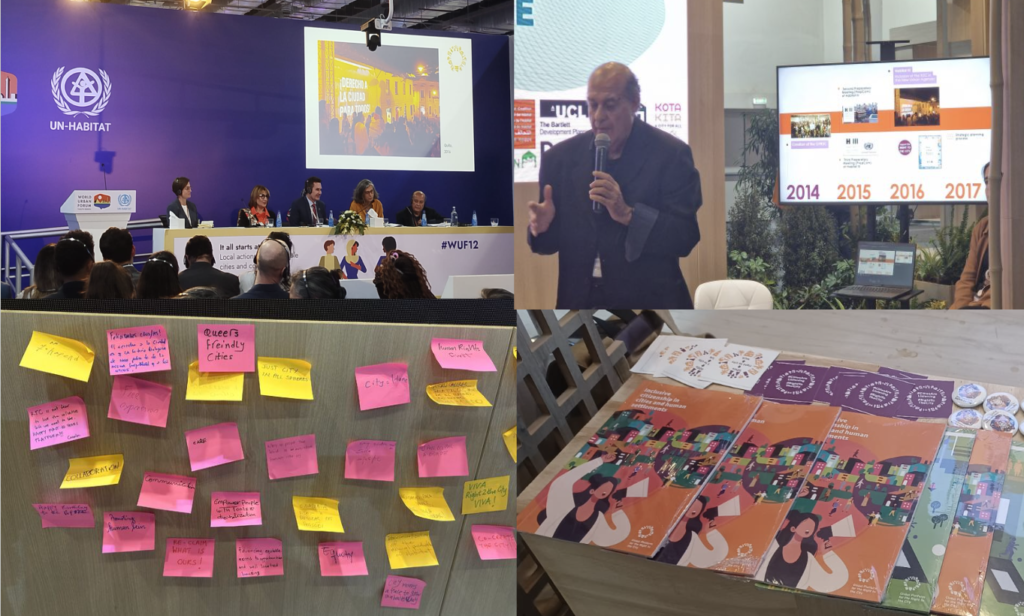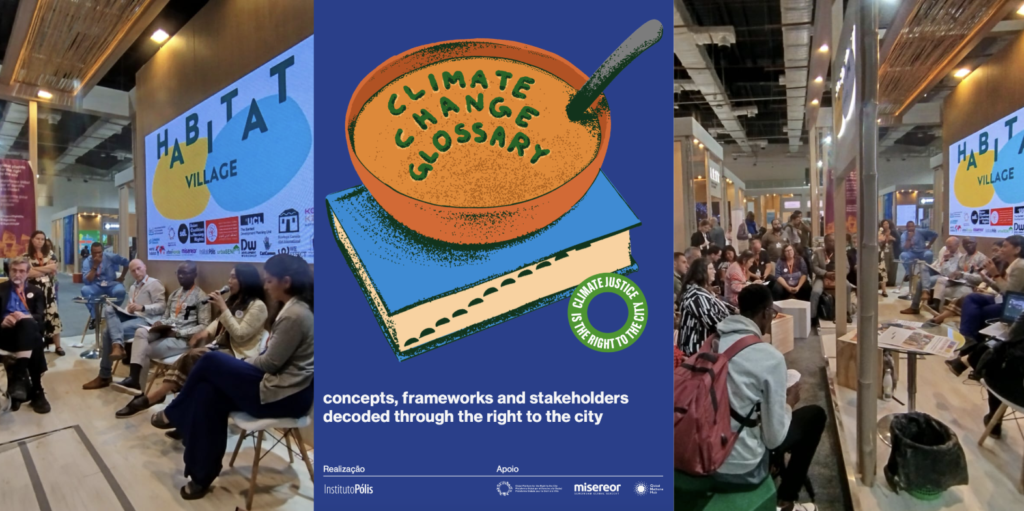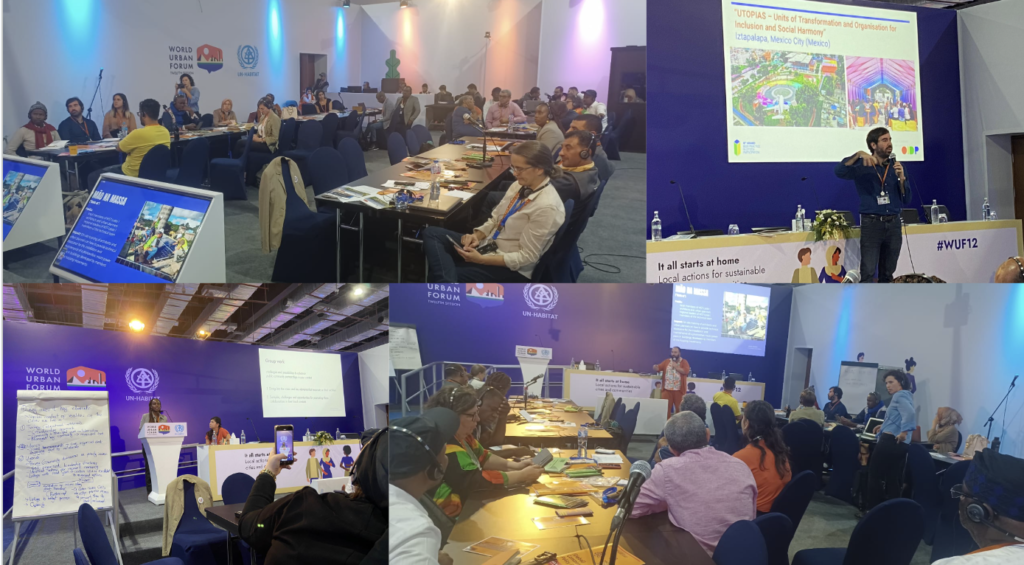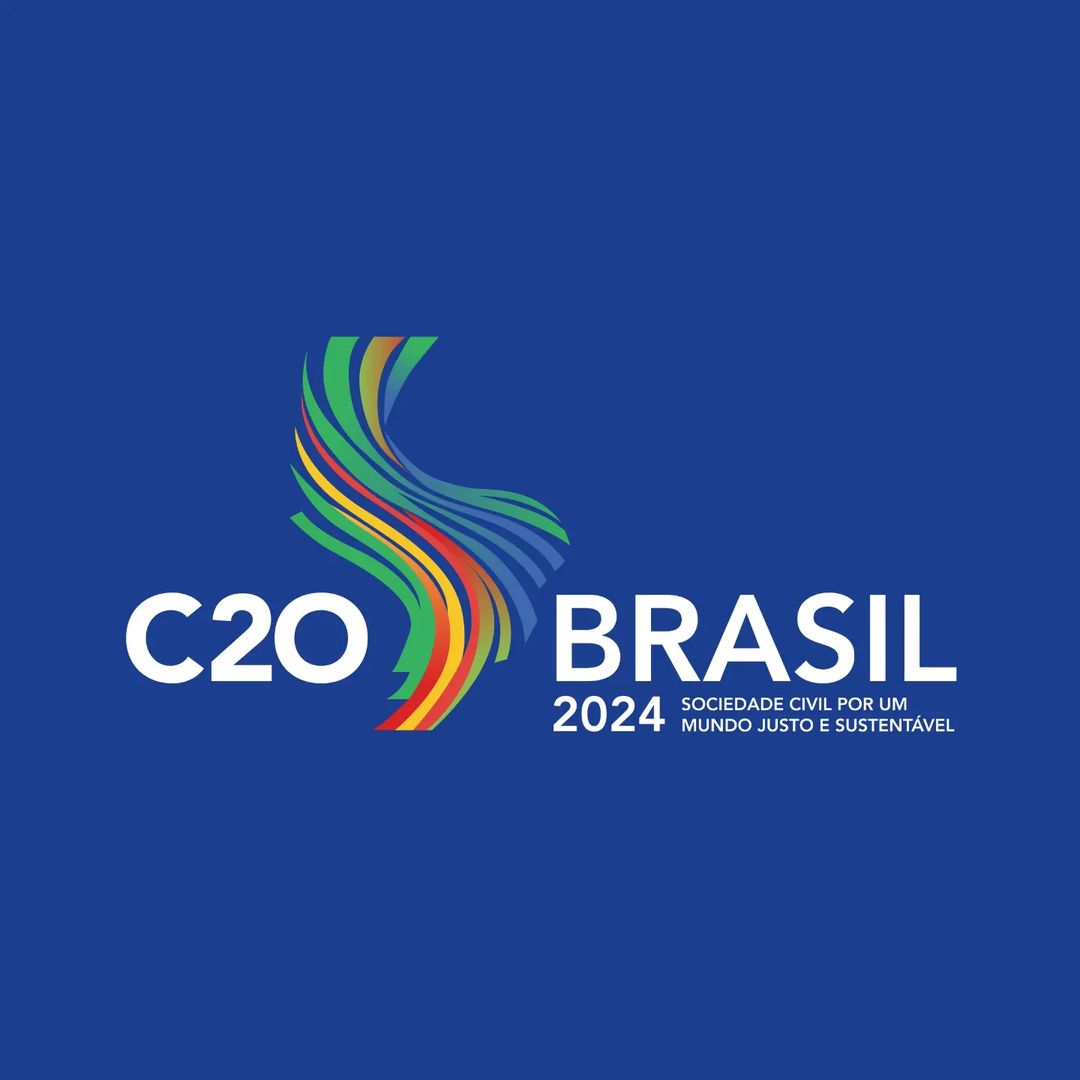
As in previous years, the GPR2C and its members have attended the 12th session of the World Urban Forum, held between November 4th and 8th in Cairo, Egypt. Amid a wide diversity of participants and thematics represented, including also a strong presence of corporate actors and traditional top-down and market oriented approaches, the forum offered an opportunity to exchange with other organizations and groups working for the defense and promotion of the Right to the City and its diverse components. For this, one highlight was joining the collective Habitat Village stand, constructed collectively with a series of allies and partners.
It was also the occasion to celebrate the 10th year anniversary of the GPR2C along with our members and partners, looking ahead at pathways for strengthening the fight for the Right to the City in multiple spheres. The GPR2C also took the opportunity to advance some of its current main thematic priorities, as well as strengthen ties with key partners and allies, with a particular emphasis at the possibilities being held by the next UN-Habitat planning cycle, which will cover also the celebration of the 10 years of the Habitat III process. Please find more information on the activities below.
10 year celebration of the GPR2C
As part of our 10th anniversary celebrations, the GPR2C’s support team convened a Networking Event highlighting the multi-scale and multi-actor partnerships needed to advance the right to the city. The event counted with participation of the new UN-Habitat Executive Director, Anaclaudia Rossbach, the United Cities and Local Governments Secretary General, Emilia Saiz, the Brazilian Minister of Cities, Jader Barbalho Filho and Habitat Internayional Coalition’s Secretary General, Yolande Hendler. Each participant brought a different but complementary contribution on how the right to the city has been incorporated in different spheres of action, a result of Platform’s advocacy for advancing the right to the city throughout the last decade.
Also, the event had interventions from key partners of the Platform that were present in the audience: Rodrigo Iacovini (Instituto Pólis), Ana Falú (CISCSA / Women and Habitat Network) and Pablo Aguilar (CJUR). In addition to being a special moment for celebrating and reviving memories and also allowing for collective reflections. Following this event, an informal celebration was held at the Habitat Village stand, reuniting members and allies that are part of our shared history. It was a moment of encounter and celebration, involving also recalling some key moments of our history and thinking of what lies ahead in the years to come.

Climate Justice
The WUF took place following the Urban October campaign focused on Right to the City and Climate Justice and centered around the release of the Climate Justice Glossary. As a continuation of such efforts and also in the framework of the current project being held along Pólis Institute, Kota Kita and Development Workshop Angola on this thematic, on the second day of the event the GPR2C organized a dialogue on climate justice held in the collective at Habitat Village stand.
This event aimed to reflect on concrete strategies for strengthening the linkages between climate justice and the right to the city. Lorena Zárate, from the GPR2C support team did a brief contextualization on the theme, highlighting the contributions of the right to the city approach to the analysis of climate justice. Then, Kelly Agopyan, also from the GPR2C support team and Instituto Pólis presented the newly launched Glossary on Climate Change, as an accessible tool to inform urban organizations around climate change concepts and governance.
The dialogue also counted with contributions from Kota Kita (Vanesha Manuturi) and Development Workshop Angola (João Domingos) who brought some of the strategies and initiatives they have been carrying out in their territorial contexts to advance climate justice within the local communities, through a participatory and rights perspective. Finally, Kai Klause, from Misereor, summarized the partners contributions, bringing together the main highlights of the discussion. The second part of the dialogue had interventions from the audience that covered topics ranging from the meaning of some climate change concepts, to the importance of emphasizing the climate injustices, including injustice in terms of collection and availability of data.

Commons
As a continuation of their joint work on commoning approaches to advance the Right to the City, the Global Platform for the Right to the City (GPR2C), Habitat International Coalition (HIC) and United Cities and Local Governments (UCLG) organized the training event on “Public-community partnerships: democratizing and improving decision-making and service delivery to advance the Right to the City for all”.
The 3-hour session counted with the participation of 25 people from 14 countries (Africa, Asia, Europe, Latin America and North America), including social movements, NGOs, public sector officials, academics and students. After a brief introduction of the event and the agenda, participants identified key words related with notions of commons/commoning, including relevant approaches linked with human rights, right to the city, common goods as not commodified and shared resources, collective ownership, as well as fundamental values such as belonging, solidarity, equity and justice. Their expectations revolved around cross-regional learning and cultural dialogue, sharing of practical examples, tools and ideas, a better understanding of the commons/commoning and the linkages between global agendas and local implementation.

The exercise was followed by a short presentation by the GPR2C support team on some conceptual aspects of the commons, their key characteristics and what they need from LRGs to flourish. Representatives from Polis Institute and the International Observatory on Participatory Democracy then highlighted concrete initiatives being developed by civil society organizations and local and regional governments in Brazil, Benin and Mexico. The cases include advancing energy transition through solar energy collectives in social housing projects in Sao Paulo and beyond, community-managed water resources in the city of Djougou, and the building of new social infrastructure hubs (Units of Transformation and Organization for Inclusion and Social Harmony-UTOPIAS in Spanish) in the highly marginalized neighbourhoods of Iztapalapa, at the periphery of Mexico City but at center of its Metropolitan Area. You can consult the presentations here.
In small groups discussion (English, French and Spanish-Portuguese) participants were able to exchange first-hand information about different contexts, as well as opportunities and challenges they face at local and national level to advance commoning initiatives. Among the issues covered were housing and land policies, basic services and infrastructure needs, food security/sovereignty and community markets, natural resources and public spaces, legal frameworks, institutional capacities and participatory decision-making. Challenges identified included excessive bureaucracy and insufficient technical knowledge, inappropriate decentralization of resources and competences, lack of continuity of public policies and programmes, political instability and conflicts, and increasing criminalization of civil society organizations. Important opportunities were also mentioned, such as community leaderships and mechanisms for mobilization, multi-sectoral and multi-scale collaborative frameworks, local democracy and participatory budgeting, as well as innovative interventions in the context of humanitarian crisis.




